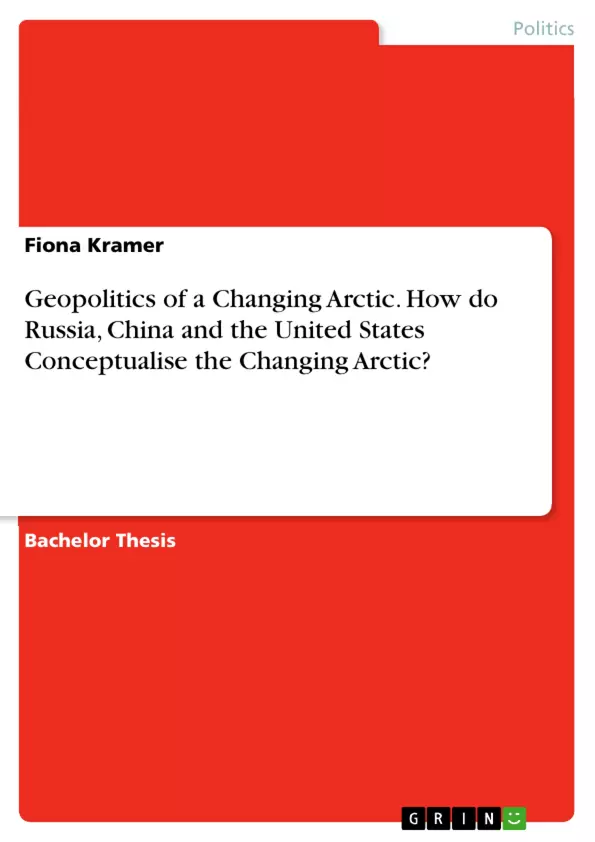This bachelorthesis examines the Arctic strategies of Russia, China and the USA. The three subjects of this study- China, Russia, and the United States have different degrees of 'material' interest in the Arctic, which is rooted in tangible assets like oil, gas, and ice- free shipping routes. Among them, China is a relatively recent participant in Arctic affairs, whereas Russia and the United States hold prominent positions as influential players in the High North. Over 60% of the Arctic landmass lies within their national borders.
While some of these interests can be quantified, they also involve intricate and qualitative questions related to identity and the perception of other actors. Though, one thing connects all three states: All have updated or published their first national Arctic strategy in the last 5 years detailing their Arctic ambitions for the future. This indicates that the changing Arctic is responsible for a changed perception of the Arctic region, which is worth exploring. The exploration of this assumption through a qualitative content analysis provides useful insights, allowing me to understand better how these states perceive the Arctic as a geographical space, themselves and other actors. This, in turn, creates a more meaningful picture of the Arctic political discourse, shedding light on the perception each country creates about itself, which may help us to understand why countries behave the way they do and even possibly predict how they might behave in the future.
Inhaltsverzeichnis (Table of Contents)
- 1. Introduction
- 2. Geopolitics
- 2.1 From classical to critical Geopolitics
- 2.2 Categories of Geopolitics
- 2.2.1 Space
- 2.2.2 Identity
- 2.2.3 Othering
- 2.3 Geopolitics in the Arctic
- 3. Russia, China and the United States- A Brief Overview
- 4. Conceptualizing the changing Arctic
- 4.1 Climate Change in the Arctic
- 4.2 The impact of the changing Arctic on Space
- 4.3 The impact of the changing Arctic on Arctic Identity
- 4.4 The impact of the changing Arctic on Othering
- 5. Method
- 5.1 The construction of Qualitative Content Analysis
- 6. Discussion
- 6.1 The added category- Conceptualisation of the Arctic as a Space of cooperation
- 6.2 China's conceptualisation of the changing Arctic
- 6.3 Russia's conceptualisation of the changing Arctic
- 6.4 The United States' conceptualisation of the changing Arctic
- 6.5 The way forward?
Zielsetzung und Themenschwerpunkte (Objectives and Key Themes)
This research aims to understand how Russia, China, and the United States conceptualize the changing Arctic, focusing on the impact of climate change and increased accessibility of resources. It utilizes a critical geopolitical perspective, examining how these states narrate and reshape the Arctic to fit their worldviews.
- The impact of climate change on Arctic geopolitics.
- How Russia, China, and the United States perceive the Arctic as a geographical space.
- The role of national identity in shaping Arctic policy.
- The perception of "other" actors in the Arctic region.
- Analysis of national Arctic strategies.
Zusammenfassung der Kapitel (Chapter Summaries)
Chapter 1: Introduction introduces the research question and the context of the changing Arctic, highlighting the shift from a cooperative to a potentially more competitive environment. It establishes a critical geopolitical framework for the analysis.
Chapter 2: Geopolitics provides a concise overview of the evolution of geopolitical thought, contrasting classical and critical geopolitical approaches. It introduces the key concepts of Space, Identity, and Othering as discursively constructed categories.
Chapter 3: Russia, China, and the United States - A Brief Overview offers a short overview of the three states' involvement in the Arctic, noting their varying levels of interest and the significance of their recently published Arctic strategies.
Chapter 4: Conceptualizing the changing Arctic explores the consequences of climate change and resource accessibility on the conceptualization of Space, Identity, and Othering in the Arctic. This chapter draws upon existing literature to provide a foundation for the analysis.
Chapter 5: Method details the theoretical approach and methodology employed, focusing on qualitative content analysis.
Chapter 6: Discussion (partially): This chapter begins to analyze the conceptualizations of the Arctic by China, Russia, and the United States, focusing on their perceptions of the Arctic as a space for cooperation and competition. The analysis of each country's perspective will be further detailed within this chapter.
Schlüsselwörter (Keywords)
Arctic geopolitics, climate change, critical geopolitics, Space, Identity, Othering, Russia, China, United States, national Arctic strategies, qualitative content analysis.
- Quote paper
- Fiona Kramer (Author), 2023, Geopolitics of a Changing Arctic. How do Russia, China and the United States Conceptualise the Changing Arctic?, Munich, GRIN Verlag, https://www.grin.com/document/1510426



